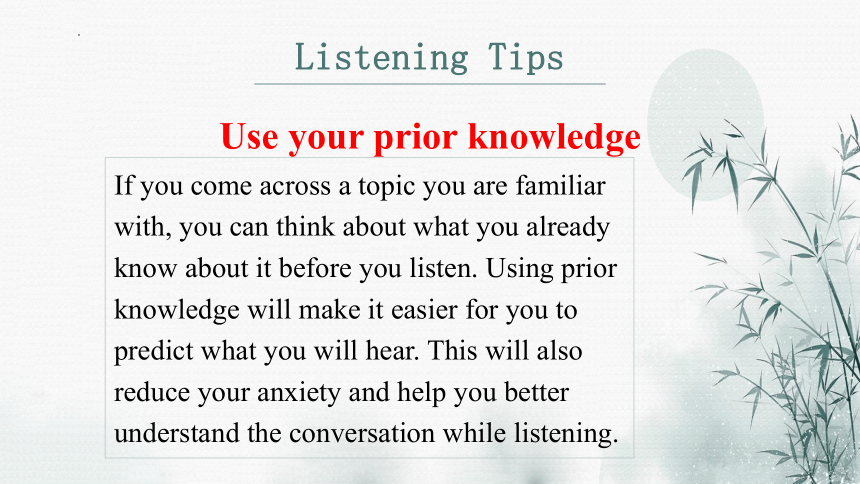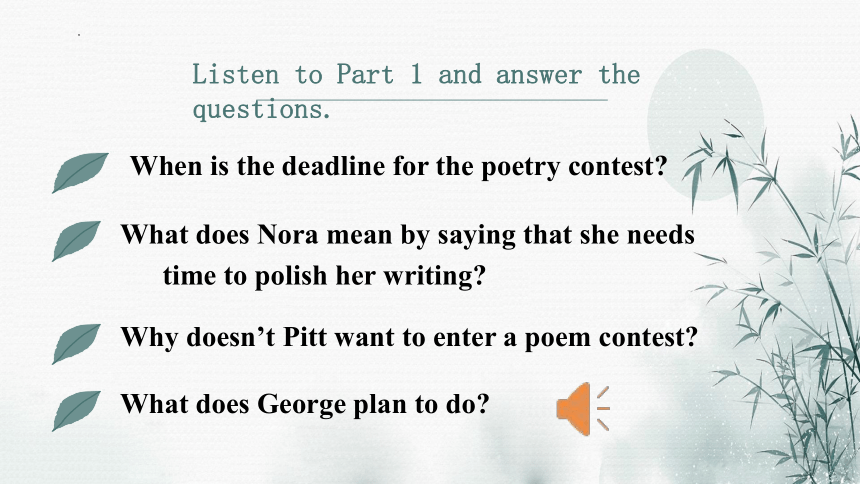人教版(2019)选择性必修第三册:Unit 5 Poems Talk about attending a poetry contest听力教学课件(17张)
文档属性
| 名称 | 人教版(2019)选择性必修第三册:Unit 5 Poems Talk about attending a poetry contest听力教学课件(17张) |  | |
| 格式 | pptx | ||
| 文件大小 | 9.5MB | ||
| 资源类型 | 教案 | ||
| 版本资源 | 人教版(2019) | ||
| 科目 | 英语 | ||
| 更新时间 | 2022-03-14 21:15:54 | ||
图片预览







文档简介
(共17张PPT)
Talk about
attending a poetry contest
Before Listening
1. Do you remember the reasons why people write poems
2. What do poets usually write about
3. How do they get inspired to write poetry
inspiration
walking
on the beach
flowers
butterfly/insect
going for a hike in the countryside
listening to favourite music
Listening Tips
If you come across a topic you are familiar with, you can think about what you already know about it before you listen. Using prior knowledge will make it easier for you to predict what you will hear. This will also reduce your anxiety and help you better understand the conversation while listening.
Use your prior knowledge
Part 01
You are going to listen to a conversation between a teacher and her students about a poetry contest.
Listen to Part 1 and answer the questions.
When is the deadline for the poetry contest
What does Nora mean by saying that she needs time to polish her writing
Why doesn’t Pitt want to enter a poem contest
What does George plan to do
Listen to Part 1 and answer the questions.
When is the deadline for the poetry contest
What does Nora mean by saying that she needs time to polish her writing
The deadline for the poetry contest is 24 June.
Nora means it’s not finished, and she needs some time to change it and make it better.
Listen to Part 1 and answer the questions.
Why doesn’t Pitt want to enter a poem contest
What does George plan to do
Pitt doesn’t want to enter a poem contest because he can’t think of anything to write about.
George plans to write his poem on the weekend but only if he feels inspired.
Nora: _______________________
Pitt:_________________________
Listen to Part 2 and find out how the students will inspire themselves to write poetry.
George:______________________
how to inspire
听取信息以动词或动词短语为主
Nora: writes best when surrounded by familiar things and will try George's method.
Pitt: listens to music while working and writing poetry.
George: plans to go for a hike in the countryside and sit quietly somewhere so he will notice a lot more to inspire interesting thoughts and words.
Listen to the two parts again and tick the expressions you hear that are used to praise and encourage somebody.
That’s a good idea. I like that idea.
That’s a good effort. You are doing well.
What a great idea! Your ideas sound very encouraging to me.
Keep up the good work. Do your best.
I think that’s a fantastic idea. You know what That’s a good idea.
Come on, you can do it. Give it your best shot.
Work in groups. Discuss entering a poem contest like the one in the listening section. The expressions in Activity 4 and the following questions may help you .
1. What kind of poem are you going to write
2. What are the topics you would love to write about
3. How will you inspire yourself to write the poem
4. Will you use rhyming words in your poem Why
Poetry should always be read aloud, as that is when you can hear the music of the words. When reading poetry aloud, start slowly. Find and emphasise the rhythm of the words. Begin to think about how the poem makes you feel – happy, sad, in love – and read the poem with emotion, pouring out your feelings.
Read poetry aloud
I breathed a song into the air,
It fell to earth, I knew no where;
For who has sight so keen and strong,
That it can follow the flight of song
Long, long afterwards, in an oak
I found the arrow, still unbroke;
And the song, from beginning to end,
I found again in the heart of a friend.
THE ARROW AND THE SONG
I shot an arrow into the air,
It fell to earth, I knew not where;
For, so swiftly it flew, the sight
Could not follow it in its flight.
H. W. Longfellow
The sun descending in the west,
The evening star does shine;
The birds are silent in their nest,
And I must seek for mine.
The moon,like a flower,
In heaven’s high bower,
With silent delight,
Sits and smiles on the night.
NIGHT
Farewell, green fields and happy groves,
Where flocks have took delight.
Where lambs have nibbled, silent moves
The feet of angels bright;
Unseen, they pour blessing,
And joy without ceasing,
On each bud and blossom,
And each sleeping bosom.
William Blake
Thank You !
谢谢观赏 !
Talk about
attending a poetry contest
Before Listening
1. Do you remember the reasons why people write poems
2. What do poets usually write about
3. How do they get inspired to write poetry
inspiration
walking
on the beach
flowers
butterfly/insect
going for a hike in the countryside
listening to favourite music
Listening Tips
If you come across a topic you are familiar with, you can think about what you already know about it before you listen. Using prior knowledge will make it easier for you to predict what you will hear. This will also reduce your anxiety and help you better understand the conversation while listening.
Use your prior knowledge
Part 01
You are going to listen to a conversation between a teacher and her students about a poetry contest.
Listen to Part 1 and answer the questions.
When is the deadline for the poetry contest
What does Nora mean by saying that she needs time to polish her writing
Why doesn’t Pitt want to enter a poem contest
What does George plan to do
Listen to Part 1 and answer the questions.
When is the deadline for the poetry contest
What does Nora mean by saying that she needs time to polish her writing
The deadline for the poetry contest is 24 June.
Nora means it’s not finished, and she needs some time to change it and make it better.
Listen to Part 1 and answer the questions.
Why doesn’t Pitt want to enter a poem contest
What does George plan to do
Pitt doesn’t want to enter a poem contest because he can’t think of anything to write about.
George plans to write his poem on the weekend but only if he feels inspired.
Nora: _______________________
Pitt:_________________________
Listen to Part 2 and find out how the students will inspire themselves to write poetry.
George:______________________
how to inspire
听取信息以动词或动词短语为主
Nora: writes best when surrounded by familiar things and will try George's method.
Pitt: listens to music while working and writing poetry.
George: plans to go for a hike in the countryside and sit quietly somewhere so he will notice a lot more to inspire interesting thoughts and words.
Listen to the two parts again and tick the expressions you hear that are used to praise and encourage somebody.
That’s a good idea. I like that idea.
That’s a good effort. You are doing well.
What a great idea! Your ideas sound very encouraging to me.
Keep up the good work. Do your best.
I think that’s a fantastic idea. You know what That’s a good idea.
Come on, you can do it. Give it your best shot.
Work in groups. Discuss entering a poem contest like the one in the listening section. The expressions in Activity 4 and the following questions may help you .
1. What kind of poem are you going to write
2. What are the topics you would love to write about
3. How will you inspire yourself to write the poem
4. Will you use rhyming words in your poem Why
Poetry should always be read aloud, as that is when you can hear the music of the words. When reading poetry aloud, start slowly. Find and emphasise the rhythm of the words. Begin to think about how the poem makes you feel – happy, sad, in love – and read the poem with emotion, pouring out your feelings.
Read poetry aloud
I breathed a song into the air,
It fell to earth, I knew no where;
For who has sight so keen and strong,
That it can follow the flight of song
Long, long afterwards, in an oak
I found the arrow, still unbroke;
And the song, from beginning to end,
I found again in the heart of a friend.
THE ARROW AND THE SONG
I shot an arrow into the air,
It fell to earth, I knew not where;
For, so swiftly it flew, the sight
Could not follow it in its flight.
H. W. Longfellow
The sun descending in the west,
The evening star does shine;
The birds are silent in their nest,
And I must seek for mine.
The moon,like a flower,
In heaven’s high bower,
With silent delight,
Sits and smiles on the night.
NIGHT
Farewell, green fields and happy groves,
Where flocks have took delight.
Where lambs have nibbled, silent moves
The feet of angels bright;
Unseen, they pour blessing,
And joy without ceasing,
On each bud and blossom,
And each sleeping bosom.
William Blake
Thank You !
谢谢观赏 !
